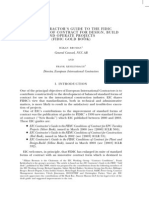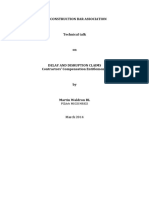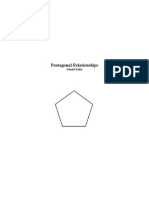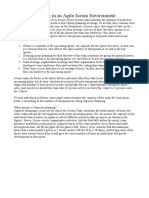Publication of ACE Professional Services Agreement 2017
Publication of ACE Professional Services Agreement 2017
Uploaded by
Justin MusopoleCopyright:
Available Formats
Publication of ACE Professional Services Agreement 2017
Publication of ACE Professional Services Agreement 2017
Uploaded by
Justin MusopoleOriginal Description:
Original Title
Copyright
Available Formats
Share this document
Did you find this document useful?
Is this content inappropriate?
Copyright:
Available Formats
Publication of ACE Professional Services Agreement 2017
Publication of ACE Professional Services Agreement 2017
Uploaded by
Justin MusopoleCopyright:
Available Formats
+
Publication of ACE
Publication of ACE Professional Professional Services
Agreement 2017
Services Agreement 2017
The ACE has added a new Professional Services
Agreement (“ACE 2017 PSA”) to its suite of
standard forms of Agreement.
Much of the text will be familiar to users of ACE Agreements 1 and 3 from the
2009 suite of Agreements, which were last revised in 2011 (“ACE 2009”).
However, instead of different versions depending on whether the Client is the
project owner or the D&B contractor, ACE 2017 PSA can be used for the
appointment of the Consultant either by the owner/authority or the contractor.
Furthermore, in another move to unify the form, the ACE has not considered it
necessary to publish a separate version for use in Scotland. Instead, ACE
2017 PSA has been drafted for use in England, Wales, Northern Ireland or
Scotland, and separate attestation clauses have been included to facilitate
this.
The ACE have introduced changes to make ACE 2017 PSA more “user
friendly”, to re-order the content in a more logical fashion, to simplify clauses
that were seen to be complex and over-lengthy and to reflect best current
practice, for example in relation to collaboration and early warning of matters
likely to impact on programme or additional costs. The “look” of ACE 2017
PSA is different since unlike ACE 2009 it is not split into separate sections.
Furthermore, all the project specific information is to be inserted into
schedules which should make ACE 2017 PSA easier to use in practice.
Users of the form will need to familiarise themselves with the numerous
changes of drafting detail from ACE 2009. The guidance notes at the back of
the form provide useful assistance for this purpose.
A point to note is that the adjustments published by ACE in an amendment
sheet dated 9 January 2017 should be incorporated in all ACE 2017 PSA
appointments by express reference and annexure.
ACE 2017 PSA retains the essential protections for Consultants found in ACE
2009, for example in relation to limitation of liability. In this connection,
consultants will welcome the addition of a mutual exclusion of liability for loss
London | Bristol | Dublin | Dubai www.beale-law.com
+
of profit, business or indirect and consequential loss. However, the form
should be significantly more attractive to developers, authorities and
contractors when appointing consultants, since the majority of the changes
may be regarded as “Client-friendly”. In this connection, the key changes
made in ACE 2017 PSA can be grouped into categories as follows:
1. Provisions which should make ACE 2017 PSA more acceptable to
the Client, but which reflect widespread practice and are generally
accepted by Consultants and their insurers.
Required standard of skill and care (clause 2.1)(i)): In terms which will be
familiar to most Consultants, there is now an “elevated” standard of skill and
care by reference to the nature, size and complexity of the Project in question.
ACE 2017 PSA follows a modern
Deleterious Materials (clause 2.1)(ii)): Clause 2 also requires the Consultant, and balanced approach and
using the required standard of care, not to specify or approve for use any compares favourably with the
materials generally known to be deleterious. other standard and non-standard
forms of appointment which are
Programme/timeliness (clause 2.2): The Consultant has a clearer obligation to widely used in today’s market.
use reasonable endeavours to comply with any programme identified in the
Appointment, or which is accepted by the Client if no programme is identified.
Client Instructions (clause 2.3): The Consultant is now obliged (i) to act in
accordance with the Client’s reasonable instructions, and (ii) to inform the
Client if the Consultant considers that an instruction is outside the scope of
the Services and will cause a change to the Programme or to the Consultant’s
fees or expenses. The former obligation will not be controversial. The latter
obligation is consistent with the philosophy that the Client should have
advance notice of any matter which is likely to impact on cost or programme,
as now provided by the “early warning” provision in clause 4 (which is
commented on below) and should be welcomed by Clients on this basis.
Consultants should, however, ensure that they are not in breach of this
obligation since otherwise they could prejudice their entitlement to additional
fees and in some circumstances may even be liable for additional costs
and/or delay incurred by the Client. No timescale is prescribed for the
Consultant to inform the Client, although Consultants should assume that
they will be in breach of this requirement if they do not provide this information
before the changes referred to are incurred.
London | Bristol | Dublin | Dubai www.beale-law.com
+
Information and instructions (clause 3.2): There are new obligations for the
Consultant to review the data and information supplied by the Client,
exercising the required standard of care.
Consultant’s Intellectual Property Rights (clause 10.1(i)): The Consultant
does not have the right to revoke or suspend the Client’s licence to use the
Consultant’s designs in the event of a payment default. The inclusion of such
a right was a common ground for clients to object to ACE 2009, but was of
doubtful utility in circumstances where the Consultant has the right to suspend
performance of all or any of its obligations subject to the relevant provisions of
the Construction Act.
Collateral warranties (clause 14): In certain circumstances, the Consultant
may be required to provide collateral warranties for the benefit of third parties.
A prescribed form of warranty is annexed to ACE 2017 PSA and includes
essential protections for the Consultant, including a net contribution clause
and a “single project cap” limitation of liability reflecting clause 10.1(i) of ACE
2017 PSA (see below).
Joint obligations (clause 4): Clause 4 sets out obligations
to collaborate in a spirit of trust and mutual support in the interests of
the timely, economic and successful completion of the Project; and
to give early warning of any matters likely to affect provision of the
Services, including delay or additional costs, and to agree steps to
mitigate the consequences.
These obligations are consistent with the Government’s endorsement of more
collaborative contracting arrangements and will be familiar to those who are
regularly appointed under the NEC3 Professional Services Contract.
Given the primary interest of the Client in the timely, economic and successful
completion of the Project, the new joint obligations should be regarded as
being of greater potential benefit to the Client than to the Consultant.
2. Provisions to improve the position of the Consultant
Limitation of Liability (clause 10.1(i)): The cap on the Consultant’s liability is
now expressed to cover its liability under any warranties it provides as well as
under ACE 2017 PSA , i.e. it is intended to work as a “single project cap”.
London | Bristol | Dublin | Dubai www.beale-law.com
+
This should be welcomed by Consultants and their insurers, since although
there is no obligation under ACE 2009 for the Consultant to enter into
collateral warranties in favour third parties, they are very commonly requested
by Clients and given by Consultants even where they have been appointed
under that form.
Exclusion of liability for loss of profit, loss of business etc (clause 10.1(ii)):
There is now a mutual exclusion of liability for direct or indirect loss of profit,
loss of business, or special, indirect or consequential loss. Given the greater
risk exposure of the Consultant to the Client if it is in breach of its appointment,
this should be regarded as being of greater potential benefit to the Consultant
than to the Client.
3. Provision reflecting best current practice and potentially of benefit
to both parties
Building Information Modelling (clause 17): Reflecting the increasing practice
of BIM, the parties are now obliged to comply with the provisions of any BIM
protocol referred to in the Schedule. The choice of Protocol is not specified,
but our recommendation is to specify the CIC BIM Protocol (in the drafting of
which Beale & Company collaborated with the CIC) rather than a “Client
bespoke” protocol.
There is no express order of priorities dealing with conflicts or discrepancies
between the selected BIM Protocol and ACE 2017 PSA. Where a BIM
protocol is to apply, this makes it even more important for the parties to review
the selected protocol carefully and to ensure that there are no inconsistencies
with the terms of ACE 2017 PSA before entering into the appointment.
New Schedules of Services and Professional Services Sub-
Consultancy Agreement
The ACE has also published two new Schedules of Services, for a Lead
Consultant and an Individual / Non-Lead Consultant, and a new Professional
Services Sub-Consultancy Agreement (“ACE PSSA 2017”).
ACE PSSA 2017 is similar in content and layout to ACE PSA 2017, subject to
a number of differences of detail which can be easily explained as a
consequence of the different considerations which apply to a Tier 2
professional appointment as opposed to a Tier 1 appointment. For example
ACE PSSA 2017 does not include an equivalent of clause 6 of the ACE PSA
London | Bristol | Dublin | Dubai www.beale-law.com
+
2017 (site staff) since it is not anticipated that the Sub-Consultant will need to
contribute site staff.
Conclusion
ACE 2017 PSA follows a modern and balanced approach and compares
favourably with the other standard and non-standard forms of appointment
which are widely used in today’s market. While retaining essential protections
from ACE 2009, the aim is that it should be easier to “sell” the form to Clients
since it now reflects up to date “best practice” from the Client’s perspective. It
follows that consultants will need to manage carefully the new obligations
introduced into the ACE 2017 PSA and make due allowance in their fees for
any additional work required in consequence.
Note
This briefing note is not an exhaustive summary of the Consultant’s
obligations under ACE 2017 PSA and consultants should familiarise
themselves with the form and consider taking legal advice before entering
into appointments based on the new form.
For further
information please
contact:
Tom Pemberton
Partner
T: +44 (0) 20 7469 0416
E: t.pemberton@beale-law.com
Nadir Hasan
Solicitor
T: +44 (0) 20 7469 0438
E: n.hasan@beale-law.com
London | Bristol | Dublin | Dubai www.beale-law.com
You might also like
- ISO 22301:2019 and business continuity management - Understand how to plan, implement and enhance a business continuity management system (BCMS)From EverandISO 22301:2019 and business continuity management - Understand how to plan, implement and enhance a business continuity management system (BCMS)Rating: 5 out of 5 stars5/5 (1)
- Ace AgreementDocument46 pagesAce Agreementmmcdaid13100% (1)
- EIC Guide To FIDIC Gold BookDocument15 pagesEIC Guide To FIDIC Gold Bookbadiehneshin50% (2)
- CCDC Documents DescriptionsDocument6 pagesCCDC Documents Descriptionsmynalawal100% (1)
- New FIDIC Gold Book Contract GuideDocument4 pagesNew FIDIC Gold Book Contract GuideJama 'Figo' MustafaNo ratings yet
- The NEC4 Engineering and Construction Contract: A CommentaryFrom EverandThe NEC4 Engineering and Construction Contract: A CommentaryNo ratings yet
- Sample BarscheduleDocument25 pagesSample BarscheduleJustin Musopole100% (1)
- 8af6ca Cis888614800287591Document71 pages8af6ca Cis888614800287591lesterbujangNo ratings yet
- The FIDIC 1999 Forms of ContractDocument5 pagesThe FIDIC 1999 Forms of ContractAZNo ratings yet
- 1992 FIDIC Joint Venture AgreementDocument27 pages1992 FIDIC Joint Venture AgreementBabu Balu Babu100% (3)
- ISO 22301: 2019 - An introduction to a business continuity management system (BCMS)From EverandISO 22301: 2019 - An introduction to a business continuity management system (BCMS)Rating: 4 out of 5 stars4/5 (1)
- FA Guide To Renovation and Maintenance of Football Pitches PDFDocument93 pagesFA Guide To Renovation and Maintenance of Football Pitches PDFJustin Musopole100% (2)
- Physics Stage 3 FinalDocument45 pagesPhysics Stage 3 FinalAnandraj GovindarajNo ratings yet
- AGC Commentary Feb 21 2018Document40 pagesAGC Commentary Feb 21 2018justnewbie100% (1)
- 2017.12.06 FENWIK ELLIOTT FIDIC 2017 SuiteDocument5 pages2017.12.06 FENWIK ELLIOTT FIDIC 2017 SuitehanzadamarzoukNo ratings yet
- Technical Line: How The New Revenue Standard Affects Engineering and Construction EntitiesDocument24 pagesTechnical Line: How The New Revenue Standard Affects Engineering and Construction EntitiesvenkatesanmuraliNo ratings yet
- HttpsDocument4 pagesHttpsDamith FernandoNo ratings yet
- FIDIC Contracts 2017-What's Changed?: Aims of The UpdateDocument8 pagesFIDIC Contracts 2017-What's Changed?: Aims of The Updatenoor bashaNo ratings yet
- Increased Size: FIDIC Redbook 2017 Vs 99 - Top 11 ChangesDocument4 pagesIncreased Size: FIDIC Redbook 2017 Vs 99 - Top 11 ChangesDangi DilleeRamNo ratings yet
- 2 Dr. ChanDocument25 pages2 Dr. Chandr.yechanNo ratings yet
- SPD Request For Bids Output and Performance Based Contracts SEA SH July 2023Document305 pagesSPD Request For Bids Output and Performance Based Contracts SEA SH July 2023richard nagassarNo ratings yet
- Program and EOTDocument12 pagesProgram and EOTKavitha GaneshamaniNo ratings yet
- Contract Administration Exam Revision NotesDocument14 pagesContract Administration Exam Revision NotesTheGimhan123No ratings yet
- ACEC Ontario MEA User Guide - 2021 - RebrandDocument8 pagesACEC Ontario MEA User Guide - 2021 - RebrandTAIYONG GUONo ratings yet
- Model ESCO Performance Contracts Sri Lanka: USAID-SARI/Energy ProgramDocument33 pagesModel ESCO Performance Contracts Sri Lanka: USAID-SARI/Energy ProgramShiv KhannaNo ratings yet
- PNACU619Document33 pagesPNACU619PAUL JEREMIAH DeleonNo ratings yet
- NEC and CLC Guidance For Dealing With Retention Payments Under NEC3 and NEC4 Contracts 15.11.22Document5 pagesNEC and CLC Guidance For Dealing With Retention Payments Under NEC3 and NEC4 Contracts 15.11.22George ParsonsNo ratings yet
- Abc Contact Enterprise Agreement: Section 1-About This AgreementDocument5 pagesAbc Contact Enterprise Agreement: Section 1-About This AgreementMohd Faizal Bin AyobNo ratings yet
- International ContractDocument8 pagesInternational ContractYeowkoon ChinNo ratings yet
- Delay and Disruption Claims March 2014 PDFDocument31 pagesDelay and Disruption Claims March 2014 PDFNuruddin CuevaNo ratings yet
- Role of The Consultant in Construction, TheDocument14 pagesRole of The Consultant in Construction, Thesupernj100% (1)
- Mosey, David. PPC 2000 - The First Standard Form of Contract For Project PartneringDocument18 pagesMosey, David. PPC 2000 - The First Standard Form of Contract For Project Partnering1NFORMA2 1nforma2No ratings yet
- HTTP CL - Exct1Document9 pagesHTTP CL - Exct1rsadibNo ratings yet
- Fidic Red Book 2017 - A Mena PerspectiveDocument8 pagesFidic Red Book 2017 - A Mena PerspectiveDavid MorgadoNo ratings yet
- Caa2009 User GuideDocument39 pagesCaa2009 User GuidedanielbedeconnellNo ratings yet
- Amending Fi Dic Contracts Nick Hen ChieDocument3 pagesAmending Fi Dic Contracts Nick Hen ChieMdms PayoeNo ratings yet
- NewsflashFIDIC Gold BookDocument4 pagesNewsflashFIDIC Gold BookChelimilla Ranga ReddyNo ratings yet
- A Comparison of NEC and FIDIC by Rob GerrardDocument4 pagesA Comparison of NEC and FIDIC by Rob Gerrardbappanadu100% (1)
- Contractual Limitations and Change Management of EPC ContractsDocument18 pagesContractual Limitations and Change Management of EPC ContractsZhijing Eu100% (2)
- AIA Conditions of Contracts A201-2007 Commentary PDFDocument59 pagesAIA Conditions of Contracts A201-2007 Commentary PDFامين الزريقي100% (1)
- Presentation On Revised ICAP Code of Ethics 2015 PDFDocument39 pagesPresentation On Revised ICAP Code of Ethics 2015 PDFrehmanzidNo ratings yet
- Fillable MEA - CEO Agreement 2016Document19 pagesFillable MEA - CEO Agreement 2016shifukaNo ratings yet
- Clyde Co - FIDIC Red Book 2017 - A MENA Perspective FINALDocument8 pagesClyde Co - FIDIC Red Book 2017 - A MENA Perspective FINALkarlosgwapo3No ratings yet
- Project Specific Preliminaries MWA 2018 05Document13 pagesProject Specific Preliminaries MWA 2018 05kmgmasedi777No ratings yet
- Collaborative Construction Procurement. PPC2000 - FAC1Document7 pagesCollaborative Construction Procurement. PPC2000 - FAC1Alicia MittaNo ratings yet
- New Fidic Yellow Book (Second Edition) : 09 May 2017 - Dubai Legal BriefingsDocument4 pagesNew Fidic Yellow Book (Second Edition) : 09 May 2017 - Dubai Legal BriefingsRafo Vega GuerovichNo ratings yet
- KKKKKK NSSSNKN JWNXJWJ XDocument8 pagesKKKKKK NSSSNKN JWNXJWJ Xyujk uaj siajNo ratings yet
- Nec3 Issues Revisions 231110 PDFDocument13 pagesNec3 Issues Revisions 231110 PDFDan CooperNo ratings yet
- Nec3 Issues Revisions 231110Document13 pagesNec3 Issues Revisions 231110Dan CooperNo ratings yet
- Five-Golden Principles of FIDICDocument4 pagesFive-Golden Principles of FIDICMintesnot Bogale100% (1)
- New FIDIC Gold Book Contract GuideDocument8 pagesNew FIDIC Gold Book Contract GuideAndreea-Cristina Draganescu100% (1)
- General Conditions ConstructionDocument59 pagesGeneral Conditions Constructionlavlav90No ratings yet
- FIDIC, NEC & JCT Disputes Clauses - Muhammad Anamul HoqueDocument20 pagesFIDIC, NEC & JCT Disputes Clauses - Muhammad Anamul HoqueMuhammad Anamul HoqueNo ratings yet
- FIDIC, NEC & JCT Disputes Clauses - Muhammad Anamul HoqueDocument20 pagesFIDIC, NEC & JCT Disputes Clauses - Muhammad Anamul HoqueMuhammad Anamul HoqueNo ratings yet
- RICS Contract Administration 2011Document36 pagesRICS Contract Administration 2011priyasujatha100% (4)
- NEC Contracts - One Stop ShopDocument3 pagesNEC Contracts - One Stop ShopHarish NeelakantanNo ratings yet
- One Step Forward Two Steps Backward A Critical Review of The FIDIC Conditions of Contract For PlantDocument24 pagesOne Step Forward Two Steps Backward A Critical Review of The FIDIC Conditions of Contract For PlantpieremicheleNo ratings yet
- Addis Ababa Science and Technology University: College of Architecture and Civil EngineeringDocument10 pagesAddis Ababa Science and Technology University: College of Architecture and Civil EngineeringMosisa ShelemaNo ratings yet
- International Public Sector Accounting Standard 32 Service Concession Arrangements: Grantor IPSASB Basis For ConclusionsDocument8 pagesInternational Public Sector Accounting Standard 32 Service Concession Arrangements: Grantor IPSASB Basis For ConclusionsJoeJoeyNo ratings yet
- Article 6 of the Paris Agreement: Drawing Lessons from the Joint Crediting Mechanism (Version II)From EverandArticle 6 of the Paris Agreement: Drawing Lessons from the Joint Crediting Mechanism (Version II)No ratings yet
- Practical Guide to the NEC3 Professional Services ContractFrom EverandPractical Guide to the NEC3 Professional Services ContractNo ratings yet
- Bar ScheduleDocument1 pageBar ScheduleJustin Musopole100% (1)
- Drawing Numbering PlanDocument1 pageDrawing Numbering PlanJustin MusopoleNo ratings yet
- NMH Doc Issue PlanDocument5 pagesNMH Doc Issue PlanJustin MusopoleNo ratings yet
- Architecture or HandicraftDocument2 pagesArchitecture or HandicraftJustin MusopoleNo ratings yet
- B087 Guide To Project Management Qualifications v2-0Document4 pagesB087 Guide To Project Management Qualifications v2-0Justin MusopoleNo ratings yet
- Raft Footing - General-ModelDocument1 pageRaft Footing - General-ModelJustin MusopoleNo ratings yet
- Mbelwa Office Block: Beam B1 Section 230x600Document6 pagesMbelwa Office Block: Beam B1 Section 230x600Justin MusopoleNo ratings yet
- 2018 FIDIC WorkshopDocument2 pages2018 FIDIC WorkshopJustin MusopoleNo ratings yet
- BearingDocument2 pagesBearingJustin MusopoleNo ratings yet
- Quotation TemplateDocument1 pageQuotation TemplateJustin MusopoleNo ratings yet
- Ranking Things and Creating League Tables in Excel TSS Practice FileDocument7 pagesRanking Things and Creating League Tables in Excel TSS Practice FileJustin MusopoleNo ratings yet
- Building Survey - Each StructureDocument1 pageBuilding Survey - Each StructureJustin MusopoleNo ratings yet
- Mahindra PickupDocument6 pagesMahindra PickupJustin MusopoleNo ratings yet
- Form of AgendaDocument1 pageForm of AgendaJustin MusopoleNo ratings yet
- Hypotheses - Directional or Non DirectionalDocument1 pageHypotheses - Directional or Non DirectionalMa. Lourdes LazaroNo ratings yet
- Acoustic Assessment of Squid StocksDocument18 pagesAcoustic Assessment of Squid StocksJohn KaruwalNo ratings yet
- พ.ร.บ.คนพ.ร.บ.คนเข้าเมือง-พ.ศ.2522 ENGLISH PDFDocument40 pagesพ.ร.บ.คนพ.ร.บ.คนเข้าเมือง-พ.ศ.2522 ENGLISH PDFเบล' ม็อทNo ratings yet
- MichaelDocument3 pagesMichaelPann Myintzu Ei100% (1)
- Registrar ProfileDocument7 pagesRegistrar Profilemantoo kumarNo ratings yet
- Wave Optics Interference of LightDocument27 pagesWave Optics Interference of LightAathi BalaNo ratings yet
- Accounting Book 1 Lupisan Baysa Answer KeyDocument176 pagesAccounting Book 1 Lupisan Baysa Answer KeyAngel ChuaNo ratings yet
- Pas Des XiDocument7 pagesPas Des XinepirohmiatiakhtarNo ratings yet
- Measuring StrainDocument6 pagesMeasuring StrainTakarookieNo ratings yet
- Dumo Vs EspinasDocument15 pagesDumo Vs EspinasGinn EstNo ratings yet
- Lots of ProbsDocument67 pagesLots of ProbsNitish Sagar PirtheeNo ratings yet
- ROYALES GELITPH XXB1 ShortPaper 2 PDFDocument2 pagesROYALES GELITPH XXB1 ShortPaper 2 PDFkyla GuanlaoNo ratings yet
- JANUARY2024 - RATE - LIST (1) ImcDocument6 pagesJANUARY2024 - RATE - LIST (1) Imcggond6830No ratings yet
- Pentagonal RelationshipsDocument6 pagesPentagonal RelationshipsDanny KahnNo ratings yet
- Biology A Level, MCQ Problem Sets, Protein Synthesis, Dna and RnaDocument5 pagesBiology A Level, MCQ Problem Sets, Protein Synthesis, Dna and RnaAcep AbdullahNo ratings yet
- EDUC 2220-Educational Technology Lesson Plan TemplateDocument4 pagesEDUC 2220-Educational Technology Lesson Plan TemplateCamaryn CornuteNo ratings yet
- NEW Power of Habits PPT - LaxmanDocument24 pagesNEW Power of Habits PPT - Laxmankarthikbollu100% (1)
- Module 6Document41 pagesModule 6Mark CalimlimNo ratings yet
- ESP Interview QuestionsDocument3 pagesESP Interview QuestionsfauxNo ratings yet
- Fundamental Concepts of Information SystemsDocument31 pagesFundamental Concepts of Information SystemsMNM100% (1)
- Beef Quality AttributesDocument7 pagesBeef Quality AttributesAnaNo ratings yet
- Recommendationletter (1) 2Document5 pagesRecommendationletter (1) 2Aric VranadaNo ratings yet
- Elective 2 Sir JaysonDocument4 pagesElective 2 Sir Jaysonペニャロサ ジョレレンNo ratings yet
- Unit V Unit CommitmentDocument8 pagesUnit V Unit CommitmentDrAurobinda Bag100% (1)
- Pan En-Hui Allyson Joy 2g Group 7 - Feature Article Backgrounder 1Document3 pagesPan En-Hui Allyson Joy 2g Group 7 - Feature Article Backgrounder 1api-546167328No ratings yet
- (Farrel Ray Tedjasukmana) - (S210) - UPHC Final Assessment (Semester 2 TA 2023-2024) - Second YearDocument5 pages(Farrel Ray Tedjasukmana) - (S210) - UPHC Final Assessment (Semester 2 TA 2023-2024) - Second YearFarrel RayNo ratings yet
- Persuasive Essay Refers To The Kind of WritingDocument2 pagesPersuasive Essay Refers To The Kind of WritingFreya YodicoNo ratings yet
- Regulation of Circadian Rhythm and TermsDocument3 pagesRegulation of Circadian Rhythm and TermsCholo AquinoNo ratings yet
- Article - Capacity Planning in An Agile Scrum Environment Revised On 04-03-2022Document4 pagesArticle - Capacity Planning in An Agile Scrum Environment Revised On 04-03-2022Miraj SheikhNo ratings yet









































































































